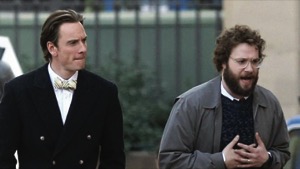
As I’ve written before, no one should ever expect historical accuracy from a feature film that is “based on a true story.” I can’t fault the total fantasy of Aaron Sorkin’s screenplay for Steve Jobs, the new biopic about the co-founder of Apple who is constantly referred to as a genius, a visionary and an asshole. Sorkin manages to do the duties of a biopic by focusing solely on the backstage conversations prior to three key product launches. The screenplay’s structure is both elegant and overly schematic, but Sorkin’s always recognizably witty and crackling dialogue makes up, or masks, the flaws. It helps that the words are recited by some of the best actors alive who are directed by the great Danny Boyle.
The film opens with grainy footage of Arthur C. Clark (who wrote the novel 2001: A Space Odyssey) explaining in the 1960s how computers will change our lives to an incredulous newscaster. The audience chuckles because the sci-fi writer predicts exactly the kind of instruments most of us have in our pockets, if not at home. The message of the film is then clear: It is Steve Jobs who makes this happen. Immediately, we are at the launch of the Macintosh – the iconic, revolutionary personal computer – in 1983. Jobs, played by the always thrilling Michael Fassbender at the height of his powers, is ordering everyone around, demanding the impossible, and basically being the narcissistic prick he had famously become since starting Apple in a garage with Steve Wozniak (an awesome Seth Rogen). Only Apple CEO and father figure John Sculley (Jeff Daniels) and Jobs’ work wife and marketing head Joanna Hoffman (Kate Winslet) can reason with Jobs, which is hard enough when it’s about the Mac and even more difficult when his ex-girlfriend Chrisann Brennan (Katherine Waterston) and Lisa, the daughter Jobs refused to admit is his, show up.
It’s difficult to decide which person he’s nastier to: Chrisann, who desperately needs money; engineer Andy Hertzfeld (Michael Stuhlbarg), who is trying to fix the Mac’s speech function for the demo; or Wozniak, who wants Jobs to acknowledge the people working on the Apple II, which was the company’s first success and Jobs wants to phase out. Chrisann and Hertzfeld succeed with their tasks but not with their pride intact, but Wozniak completely fails. All of these characters return to rehash, continue, or resolve these conflicts in the next two acts, which are based on the launch of Jobs’ NeXT computer, which he developed after being fired (more or less) by Apple for his irascible ways, and the launch of the iMac, the computer that brought Apple back to life after Sculley is fired and Jobs is rehired.
While Jobs is on screen at virtually every moment, few of his dialogue partners are ever on screen with each other. It feels very much like a beautifully filmed play; intense and cerebral but also claustrophobic. It is the series of one-on-one conversations that both tell us Jobs’ biographical details and show us how his relationships with these key people – particularly Joanna, Sculley, Wozniak and Lisa (most importantly played by Perla Haney-Jardine in Act 3) – explain his drive, his genius and his failures as a friend and father. The ending is unnecessarily pat, but neither Aaron Sorkin nor Danny Boyle would ever refuse to please the crowd. And the film is a crowd pleaser, funny and wise, daring and illuminating. It is also hagiography, showing Jobs’ great faults but also lifting him onto a pedestal with people like Albert Einstein and Bob Dylan. Which is exactly where Steve Jobs thought he should be.
Steve Jobs
Directed by Danny Boyle
Written by Aaron Sorkin
Starring Michael Fassbender, Kate Winslet and Seth Rogen
Inexplicably Rated R











